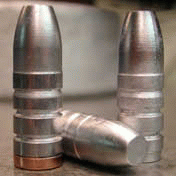

 The Accurate Reloading Forums
The Accurate Reloading Forums  THE ACCURATE RELOADING.COM FORUMS
THE ACCURATE RELOADING.COM FORUMS  Guns, Politics, Gunsmithing & Reloading
Guns, Politics, Gunsmithing & Reloading  Cast Bullets
Cast Bullets  switch from solder to wheel weights
switch from solder to wheel weightsGo  | New  | Find  | Notify  | Tools  | Reply  |  |
| one of us |
Is it in my interest to try to duplicate 25-1 lead to tin bullets that are very high quality to getting a simular hardness with wheel weights.??. I can get a hardness tester and go that rout and hardness test and mix large quanties of lead at the hardness i need??? im guessing?? ...... I cast bullets in my basement with a fan blowing outside and am conserned about that with antimony.. Another option is i get good results of moulder purchased pure lead hollow based bullets (colt .45) made with a rapine mould.. But that mold is a single, and sounds like time consuming.. Whats making me consider this is that the casters are months behind filling huge orders by police depts, etc that are having heart attacks about the metals pricing.. any comments welcome.. It may be interesting that hollow base pure lead bullets was typical in my understanding, to the original bullets used for the .45.. dave.. hunter, blackpowder shooter, photographer, gemology, trap shooter,duck hunter,elk, deer, etc.. | ||
|
| one of us |
ffffg---Before I started casting and reloading,I did a bit of reading on the subject. One book I read was the Lyman reloading Manual and in there I read their blend of Lyman #2 etc. The thing that hit me was that they were taking wheel weights---an unknown quantity--and adding exact amounts of this and that and coming up with an exact. How can that be? This lead me to believe that maybe it's not really so exacting afterall. If it melts it makes bullets. So for years I pretty much used wheel weights and whatever else I found. Then I started casting .22 cals and was told repeatedly gotta add tin for fill out. So I bought some tin. Couldn't tell a bit of difference. This aint rocket science--use those wheel weights. | |||
|
| one of us |
The bullet as it drops from the mould must be the correct diameter. Pure lead in most moulds will be to small, unless the mould is for a bullet used for muzzle loading or cap and ball pistols. To make a larger bullet, tin and antimony needs to be added to the pure lead.Wheel weights are fine if you can get the correct bullet diameter. Tin i feel is a must have in the mix to keep from leading the barrel. When using wheel weights to cast, the diameter of the bullet as it comes from the mould is most important.Antimony is a poison, but i don't think its a real problem unless you cast bullets every day. Wash before eating, use a fan as u do. Pure lead in a 45 colt may work with very low velocity and a very good lube, as long as you can get the correct bullet diameter as it drops from the mould. | |||
|
| new member |
A note from a new member: One thing I have noticed is that WW alloy seems to have some antimony. I don't know if it has tin, but the ingots I cast out from WW alloy are considerably harder than pure lead. It gives more of a clink sound when tapped compared to lead. A lot of tin makes pretty bullets, but tin is way expensive. My reading tells me that you need both antimony and tin in the allow to get good hardness. One thing I have found is WW from truck tire places are nice cause they're so big. I find linotype at my metal place here in town for $.85/lb. I keep buying it, because politicians and others will eventually try to shut us down. ______________________ NRA Life Member 1987 | |||
|
| one of us |
Wheel weights have both tin and antimony as part of the alloy, although the amounts have been reduced over the years. Looking at your handle, might you be doing black powder loads in your .45 which would require a much softer alloy? I don't work with alloys that soft so I'd be guessing at best, but you might try 8 pounds of pure and 2 pounds of wheel weights with just enough tin for proper mould fill out. Maybe about an 18" strip of 95/5 percent lead free solder would be about right. cast a few bullets and test the hardness, then add a bit more lead or wheel weight metal to reach the hardness level you want. As far as the comment on having problems due to casting literally every day, I did that for 4 years working for a comemrcial caster back in the late 1950s, and have cast most of the time ever since. I have had my lead level blood serum checked at least once a year and even after 53 years of casting bullets, my lead level is below what is considered normal, even under today's lowered standard of what is considered acceptable. While one must take reasonable precautions while working with lead, I'm more of the thought that the hazards are overstated by the blissninny ecofreaks and nannystaters who want to control our lives from birth till death. Wash your hands twices after casting. Don't eat, drink or smoke while casting, and before washing your hands, throw the clothes in the washing machine and change clothes. Nothing more than common sense safety practices. You're in more danger from spilled lead than lead poisoning IMHO, and you don't have to ask me how I know about that one. Paul B. | |||
|
one of us |
Wheelweights (clip-on) usually have around 3-4% antimony and 0.5-1% tin, the rest lead. YMMV. They recycle them and no telling what can get in them, including zinc. You can skim that out by heating them just above melting and let the metal sit undisturbed, and unfluxed till the zinc crystals float to the top. "A cheerful heart is good medicine." | |||
|
| One of Us |
Check out the alloy calculator posted over on CB in this thread. alloy calculator in this thread Post dated 10-25-07 by "John Boy". It's helped me figure out how to blend the 5 different sources/types of scrap lead alloy that I have, to get what I want. | |||
|
| Powered by Social Strata |
| Please Wait. Your request is being processed... |
|
 The Accurate Reloading Forums
The Accurate Reloading Forums  THE ACCURATE RELOADING.COM FORUMS
THE ACCURATE RELOADING.COM FORUMS  Guns, Politics, Gunsmithing & Reloading
Guns, Politics, Gunsmithing & Reloading  Cast Bullets
Cast Bullets  switch from solder to wheel weights
switch from solder to wheel weights

Visit our on-line store for AR Memorabilia

